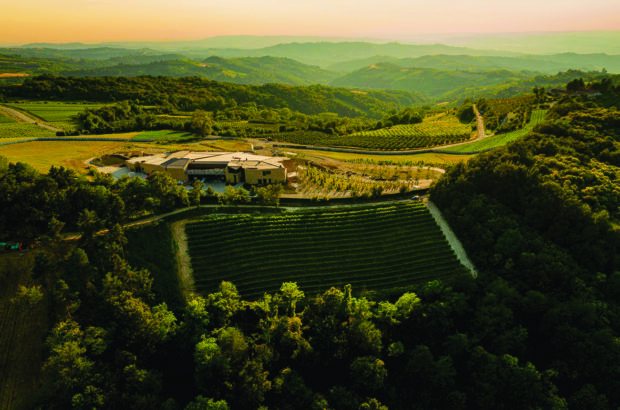Amphora wines have an incredibly long history: the clay amphora was used for winemaking in Georgia (where it is known as a ‘qvevri’) at least as far back as 8,000 years ago, according to the archaeological record.
In ancient Greece (‘pithos’) and Rome (‘dolium’), clay vessels were used both for producing and transporting wine. Spain (‘tinajas’) and Portugal (‘talhas’) also have very long traditions of using clay vessels for winemaking.
Scroll down to see tasting notes and scores for 15 great amphora wines from Armenia, Italy, Croatia, Portugal and Austria
Amphorae for winemaking come in many sizes, from 250-litres to several thousand-litres, and can be made from several different types of clay. These porous containers are essentially egg-shaped vessels where the grape juice is pressed and fermented, remaining in contact with the grape skins for an extended period of time ranging from just a few days up to several years.
{"content":"PHA+QXMgd2luZSBwcm9kdWN0aW9uIG1vZGVybmlzZWQsIG1vc3QgcHJvZHVjZXJzIGNob3NlIHdvb2RlbiBiYXJyZWxzLCBhbmQgc3RlZWwgYW5kIGNvbmNyZXRlIHRhbmtzLCB3aGljaCB3ZXJlIGVhc2llciB0byB1c2UgYW5kIGNsZWFuLiBBcyBhIHJlc3VsdCwgYW1waG9yYWUgYWxsIGJ1dCBkaXNhcHBlYXJlZCwgYnV0IHRoZXkgaGF2ZSBjb21lIGJhY2sgaW4gbGVhcHMgYW5kIGJvdW5kcyBpbiByZWNlbnQgZGVjYWRlcyB0aGFua3MgdG8gcGlvbmVlcnMgc3VjaCBhcyBKb3NrbyBHcmF2bmVyIGZyb20gRnJpdWxpIFZlbmV6aWEgR2l1bGlhIGluIEl0YWx5LjwvcD4KPGgyPldoeSBkbyB3aW5lbWFrZXJzIHVzZSBhbXBob3JhPzwvaDI+CjxwPlRoZSByZWFzb25zIGZvciBtYWtpbmcgd2luZSBpbiBhbXBob3JhIHZhcnkgZnJvbSBwcm9kdWNlciB0byBwcm9kdWNlcjogc29tZSB3aG8gSSBzcG9rZSB0byBiZWxpZXZlIHRoYXQgdGhlIGNoYXJhY3RlciBvZiB0aGUgZ3JhcGUgdmFyaWV0eSBhbmQgdGVycm9pciBzaG93IG1vcmUgY2xlYXJseSBpbiBhbXBob3JhZSB0aGFuIGluIG90aGVyIHZlc3NlbHMuIENsYXkgY2FuIGJlIHRob3VnaHQgb2YgYXMgYSBtaWRkbGUgZ3JvdW5kIGJldHdlZW4gc3RlZWwgYW5kIG9hazsgc3RhaW5sZXNzIHN0ZWVsIGFsbG93cyBmb3IgYW4gb3h5Z2VuLWZyZWUgZW52aXJvbm1lbnQgYW5kIGRvZXNu4oCZdCBpbXBhcnQgYW55IGZsYXZvdXJzIGF0IGFsbCBpbnRvIHRoZSB3aW5lLCB3aGlsZSBvYWsgYWxsb3dzIG94eWdlbiB0byByZWFjaCB0aGUgd2luZSBhbmQgdGhlIHdvb2QgcmVsZWFzZXMgYXJvbWFzIGFuZCBmbGF2b3Vycy48L3A+CjxwPjxkaXYgY2xhc3M9ImFkLWNvbnRhaW5lciBhZC1jb250YWluZXItLW1vYmlsZSI+PGRpdiBpZD0icG9zdC1pbmxpbmUtMiIgY2xhc3M9ImlwYy1hZHZlcnQiPjwvZGl2PjwvZGl2PjwvcD4KPHA+TGlrZSBvYWssIGNsYXkgaXMgcG9yb3VzLCBhbGxvd2luZyBveHlnZW4gdG8gcmVhY2ggdGhlIHdpbmUsIGJ1dCBsaWtlIHN0ZWVsIGl04oCZcyBhIG5ldXRyYWwgbWF0ZXJpYWwgdGhhdCB3b27igJl0IGltcGFydCBhbnkgYWRkaXRpb25hbCBmbGF2b3Vycy48L3A+CjxwPlNvbWUgcHJvZHVjZXJzIGV4cGxhaW5lZCB0aGVpciBwcmltYXJ5IGRlY2lzaW9uIHRvIHVzZSBhbXBob3JhZSBhcyBrZWVwaW5nIGFuIGFuY2llbnQgdHJhZGl0aW9uIGFsaXZlLCBhbmQgYWNoaWV2aW5nIGEgc3Ryb25nZXIgY29ubmVjdGlvbiB0byBoaXN0b3J5LjwvcD4KPHA+VGhlIGNhc2UgZm9yIGFtcGhvcmEgd2luZXMgYWxzbyBtZXQgc29tZSBjcml0aWNhbCB2b2ljZXM6IHdpbmVzIG1hZGUgaW4gYW1waG9yYSBjYW5ub3QgYmUgYWdlZCBidXQgbXVzdCBiZSBkcnVuayB5b3VuZyBiZWNhdXNlIG9mIHRoZSB2b2xhdGlsZSBhY2lkczsgYW1waG9yYWUgcmVsZWFzZSBtZXRhbCBjb21wb3VuZHMgaW50byB0aGUgd2luZTsgYW1waG9yYSB3aW5lcyBhcmUgYSBmYWQgZm9yIHRob3NlIHdobyB3YW50IHRvIOKAmGJlIGRpZmZlcmVudOKAmS48L3A+CjxkaXYgY2xhc3M9ImFkLWNvbnRhaW5lciBhZC1jb250YWluZXItLW1vYmlsZSI+PGRpdiBpZD0icG9zdC1pbmxpbmUtMyIgY2xhc3M9ImlwYy1hZHZlcnQiPjwvZGl2PjwvZGl2Pgo8cD5BZnRlciB0YXN0aW5nIGFwcHJveGltYXRlbHkgMTAwIGFtcGhvcmEgd2luZXMgYXQgdGhlIFRlcnJhY290dGEgJmFtcDsgV2luZSBmZXN0aXZhbCBpbiBDZXJ0b3NhIHRoaXMgSnVuZSwgaXQmIzgyMTc7cyBjbGVhciB0aGF0IHF1YWxpdHkgYW5kIHN0eWxlIHZhcmllcyBkcmFtYXRpY2FsbHkuIEJlbG93LCBJJiM4MjE3O3ZlIHBpY2tlZCBvdXQgbXkgdG9wIDE1IHRvIHRyeS48L3A+CjxoMj5BbXBob3JhIHdpbmUgcHJvZHVjZXJzIHRvIGtub3c8L2gyPgo8aDM+PHN0cm9uZz4xNzAxIEZyYW5jaWFjb3J0YTwvc3Ryb25nPjwvaDM+CjxwPjE3MDEgRnJhbmNpYWNvcnRhIGlzICYjODIxMTsgZm9yIHRoZSBtb21lbnQgJiM4MjExOyB0aGUgb25seSBiaW9keW5hbWljIHdpbmVyeSBpbiA8YSBocmVmPSJodHRwczovL3d3dy5kZWNhbnRlci5jb20vZnJhbmNpYWNvcnRhLyIgdGFyZ2V0PSJfYmxhbmsiIHJlbD0ibm9vcGVuZXIgbm9yZWZlcnJlciI+PHN0cm9uZz5GcmFuY2lhY29ydGE8L3N0cm9uZz48L2E+LiBUaGUgd2luZXJ5IHdhcyBib3JuIGluIDIwMTEgd2hlbiBTaWx2aWEgYW5kIEZlZGVyaWNvIFN0ZWZpbmkgcHVyY2hhc2VkIHRoZSBsYW5kIGZyb20gdGhlIENvbnRpIEJldHRvbmkgQ2F6emFnbyBmYW1pbHkuIFRoZXkgY2hvc2UgdG8gd29yayB3aXRoIGEgeW91bmcgdGVhbSBhbmQgZXhwZXJpbWVudCB3aXRoIGRpZmZlcmVudCB3aW5lbWFraW5nIHRlY2huaXF1ZXMgYW5kIGFnZWluZyB2ZXNzZWxzLjwvcD4KPGRpdiBjbGFzcz0iYWQtY29udGFpbmVyIGFkLWNvbnRhaW5lci0tbW9iaWxlIj48ZGl2IGlkPSJwb3N0LWlubGluZS00IiBjbGFzcz0iaXBjLWFkdmVydCI+PC9kaXY+PC9kaXY+CjxwPlNpbmNlIDIwMTYsIHRoZSB3aW5lcnkgaGFzIGJlZW4gY2VydGlmaWVkIGJpb2R5bmFtaWMgYnkgRGVtZXRlci4gVGhlIHZpbmV5YXJkcyBjb3ZlciAxMSBoZWN0YXJlcywgb2Ygd2hpY2ggOGhhIGFyZSBDaGFyZG9ubmF5IGFuZCAzaGEgYXJlIFBpbm90IE5vaXIuIFRoZSBwcm9wZXJ0eSBpcyBkaXZpZGVkIGludG8gZGlmZmVyZW50IHBhcmNlbHMsIG1hbmFnZWQgYW5kIHZpbmlmaWVkIHNlcGFyYXRlbHkgdG8gaGlnaGxpZ2h0IHRoZSBwZWN1bGlhciBjaGFyYWN0ZXJpc3RpY3Mgb2YgZWFjaCBwbG90LjwvcD4KPHA+VGhlIG1vc3Qgc2lnbmlmaWNhbnQgcHJvZHVjdGlvbiBpcywgb2YgY291cnNlLCBzcGFya2xpbmcgd2luZSwgYnV0IG9uZSBzdGlsbCB3aW5lIGlzIGFsc28gbWFkZTogU3VybsOhdC4gQSAxMDAgJSBDaGFyZG9ubmF5LCBpdCBpcyBmZXJtZW50ZWQgYW5kIGFnZWQgaW4gdGVycmFjb3R0YSBmb3IgZWlnaHQgbW9udGhzLjwvcD4KPGRpdiBjbGFzcz0iYWQtY29udGFpbmVyIGFkLWNvbnRhaW5lci0tbW9iaWxlIj48ZGl2IGlkPSJwb3N0LWlubGluZS01IiBjbGFzcz0iaXBjLWFkdmVydCI+PC9kaXY+PC9kaXY+CjxoMz48c3Ryb25nPkNpcmVsbGkgPC9zdHJvbmc+PC9oMz4KPHA+SW4gdGhlIEl0YWxpYW4gcmVnaW9uIG9mIDxhIGhyZWY9Imh0dHBzOi8vd3d3LmRlY2FudGVyLmNvbS93aW5lL3dpbmUtcmVnaW9ucy9hYnJ1enpvLyIgdGFyZ2V0PSJfYmxhbmsiIHJlbD0ibm9vcGVuZXIgbm9yZWZlcnJlciI+PHN0cm9uZz5BYnJ1enpvPC9zdHJvbmc+PC9hPiwgRnJhbmNlc2NvIENpcmVsbGkgZmFybXMgc2V2ZW4gaGVjdGFyZXMgd2l0aCBoaXMgd2lmZSwgTWljaGVsYS4gSW4gMjAxMSwgdGhleSBiZWdhbiB1c2luZyBhbXBob3JhZSAmIzgyMTY7dG8ga2VlcCB0aGUgZnJ1aXQgYmV0dGVyIGFuZCB0byBhdm9pZCBhIHJlZHVjdGlvbiBpbiB0aGUgcmVkIE1vbnRlcHVsY2lhbm8gZCYjODIxNztBYnJ1enpvJiM4MjE3OywgYXMgRnJhbmNlc2NvIGV4cGxhaW5zLiBUb2RheSB0aGVyZSBhcmUgMjIgYW1waG9yYWUgaW4gdGhlIGNlbGxhciwgYm90aCBhYm92ZSBncm91bmQg4oCTIGZvciBmZXJtZW50YXRpb24gJiM4MjExOyBhbmQgdW5kZXJncm91bmQsIGZvciBhZ2VpbmcuPC9wPgo8cD5DaXJlbGxpIG9ubHkgdXNlcyB3aWxkIHllYXN0IHRvIHN0YXJ0IHRoZSBmZXJtZW50YXRpb24gZm9yIGFsbCB0aGUgd2luZXMsIGFuZCBhbGwgZ3JhcGVzIGFyZSBoYXJ2ZXN0ZWQgYnkgaGFuZC48L3A+CjxoMz48c3Ryb25nPkNhc2FkZWk8L3N0cm9uZz48L2gzPgo8cD5TdGVmYW5vIENhc2FkZWkgYW5kIGhpcyBmYW1pbHkgb3duIENhc3RlbGxvIGRlbCBUcmViYmlvIGluIENoaWFudGksIFRlbnV0YSBDYXNhZGVpIGluIE1hcmVtbWEsIGFuZCB0aGUgT2xpYW5hcyBjb21wYW55IGluIHRoZSBwcm92aW5jZSBvZiBOdW9ybywgPGEgaHJlZj0iaHR0cHM6Ly93d3cuZGVjYW50ZXIuY29tL3ByZW1pdW0vc2FyZGluaWEtd2luZS1hLWJ1eWVycy1ndWlkZS00MDY3NDMvIiB0YXJnZXQ9Il9ibGFuayIgcmVsPSJub29wZW5lciBub3JlZmVycmVyIj48c3Ryb25nPlNhcmRpbmlhPC9zdHJvbmc+PC9hPi4gSGUgaGFzIGxhdW5jaGVkIHRoZSBhbXBob3JhIGNvbGxlY3Rpb24gJiM4MjE2O0xlIEFuZm9yZSYjODIxNzsgd2l0aCBoaXMgZGF1Z2h0ZXIgRWxlbmEuICYjODIxNjtUaGUgQW5mb3JlIGxpbmUgd2FzIGJvcm4gZnJvbSBhIHNpbXBsZXIgYW5kIG1vcmUgbmF0dXJhbCBpZGVhIG9mIG9lbm9sb2d5LCBzdWl0ZWQgdG8gcHJvZHVjaW5nIHdpbmVzIHRoYXQgZmFpdGhmdWxseSBleHByZXNzIHRoZSBjaGFyYWN0ZXJpc3RpY3Mgb2YgZGlmZmVyZW50IHRlcnJvaXJzIGFuZCB2aW5lcywmIzgyMTc7IHNheXMgRWxlbmEgQ2FzYWRlaS48L3A+CjxwPkV2ZXJ5IHllYXIgc2hlIHNlbGVjdHMgdGhlIHZhcmlldGllcyB0aGF0IGhhdmUgcHJvZHVjZWQgdGhlIGJlc3QgcmVzdWx0cyBpbiBhbXBob3JhIGFtb25nIGFsbCB0aGUgd2luZXMgb2YgdGhlIGZhbWlseSBlc3RhdGVzLiBTaGUgc3VwZXJ2aXNlcyB0aGUgdmluaWZpY2F0aW9uIHBoYXNlLCBkZWNpZGluZyB0aGUgbWFjZXJhdGlvbiBhbmQgYWdlaW5nIHBlcmlvZC48L3A+CjxoMz48c3Ryb25nPkVsZW5hIEZ1Y2NpPC9zdHJvbmc+PC9oMz4KPHA+RWxlbmEgRnVjY2kgd29ya3Mgd2l0aCB0aGUgcmVkIHZhcmlldHksIEFnbGlhbmljbywgd2hpY2ggdGhyaXZlcyBpbiB0aGUgdm9sY2FuaWMgc29pbHMgb2YgVnVsdHVyZSBpbiA8YSBocmVmPSJodHRwczovL3d3dy5kZWNhbnRlci5jb20vcHJlbWl1bS9iYXNpbGljYXRhLXdpbmUtcmVnaW9uYWwtcHJvZmlsZS00NzcwOTkvIiB0YXJnZXQ9Il9ibGFuayIgcmVsPSJub29wZW5lciBub3JlZmVycmVyIj48c3Ryb25nPkJhc2lsaWNhdGE8L3N0cm9uZz48L2E+LiBTaGUgdG9vayBvdmVyIGhlciBncmFuZHBhcmVudCYjODIxNztzIHZpbmV5YXJkcyAyMCB5ZWFycyBhZ28sIHNpdHVhdGVkIGF0IDYwMCBtZXRyZXMgYWJvdmUgc2VhIGxldmVsLjwvcD4KPHA+VGhlIEFnbGlhbmljbyB2YXJpZXR5IGhhcyBhIGRhcmsgY29sb3VyLCBoaWdoIHRhbm5pbnMgYW5kIGhpZ2ggYWNpZGl0eSBhbmQgaXMgb2Z0ZW4gY2FsbGVkIHRoZSAmIzgyMTY7QmFyb2xvIG9mIHRoZSBzb3V0aCYjODIxNzsuIEZ1Y2NpIHJlY2VudGx5IGJlZ2FuIGV4cGVyaW1lbnRpbmcgd2l0aCBhbXBob3JhIHRvIGJldHRlciBoYW5kbGUgYXJvbWFzIGFuZCB0YW5uaW5zLiAmIzgyMTY7VGhlIHdpbmUgZGV2ZWxvcHMgZmFzdGVyIGluIGFtcGhvcmEsIGFuZCBiZWNvbWVzIG1vcmUgbWluZXJhbCwgc29tZXRoaW5nIHBvc2l0aXZlIGZvciBBZ2xpYW5pY28gdGhhdCBvdGhlcndpc2UgbmVlZHMgYSBsb25nIHRpbWUgb2YgYWdlaW5nIHRvIGRldmVsb3AgY29ycmVjdGx5LCYjODIxNzsgc2hlIHNhaWQuPC9wPgo8aDM+PHN0cm9uZz5GYXR0b3JpYSBMZSBNYXNzZTwvc3Ryb25nPjwvaDM+CjxwPkZhdHRvcmlhIExlIE1hc3NlIGlzIGEgc21hbGwgZmFtaWx5LXJ1biBiaW9keW5hbWljIHdpbmVyeSBpbiB0aGUgPGEgaHJlZj0iaHR0cHM6Ly93d3cuZGVjYW50ZXIuY29tL3ByZW1pdW0vY2hpYW50aS1jbGFzc2ljby1uZXctcmVsZWFzZXMtYmVzdC1idXlzLWluLTIwMjItNDgwNTEwLyIgdGFyZ2V0PSJfYmxhbmsiIHJlbD0ibm9vcGVuZXIgbm9yZWZlcnJlciI+PHN0cm9uZz5DaGlhbnRpIENsYXNzaWNvPC9zdHJvbmc+PC9hPiBhcmVhIGluIEJhcmJlcmlubyBWYWwgRCYjODIxNztFbHNhLiBJbiAyMDE4LCBhIG5ldyBnZW5lcmF0aW9uIGVudGVyZWQgdGhlIGZhbWlseSBidXNpbmVzczogc2libGluZ3MgUm9iaW4gYW5kIExlYSBNdWduYWluaSBicmluZyBuZXcgbGlmZSB0byB0aGlzIHNtYWxsIGZhcm0sIHdoZXJlIG5vdCBvbmx5IGNhbiB5b3UgdGFzdGUgd2luZSBidXQgYWxzbyB0YWtlIHlvZ2Egb3IgYXJ0IGNsYXNzZXMuICYjODIxNjtXZSBjb25zaWRlciBvdXJzZWx2ZXMgYXJ0aXNhbnM7IHRoZXJlZm9yZSwgZWFjaCBzdGFnZSBvZiBwcm9jZXNzaW5nIGlzIGFzIG1hbnVhbCBhcyBwb3NzaWJsZSwgZnJvbSBncmFwZSBoYXJ2ZXN0aW5nIHRvIHdvcmsgaW4gdGhlIGNlbGxhci4gV2UgZG8gbm90IHVzZSBwdW1wcyB0aHJvdWdob3V0IHRoZSBmZXJtZW50YXRpb24gcGVyaW9kLCBub3IgZG8gd2UgdXNlIHNlbGVjdGVkIHllYXN0cywgZW56eW1lcywgYmFjdGVyaWEsIG9yIGFueSBhcm9tYXRpYyBhZGRpdGl2ZSYjODIxNzssIFJvYmluIHNheXMuPC9wPgo8cD5UaGVpciBzbWFsbCBwcm9kdWN0aW9uLCBpZiBub3QgdG8gc2F5IHRpbnkgJiM4MjExOyBqdXN0IGEgY291cGxlIG9mIGh1bmRyZWQgYm90dGxlcyAmIzgyMTE7IG9mIENhbXBvcmVsbGEgVHJlYmJpYW5vIFRvc2Nhbm8gaXMgbWFkZSBpbiBhbXBob3JhLiBBcyBhbiBhZHZpc2VyLCBib3RoIGluIHRoZSBmaWVsZCBhbmQgY2VsbGFyLCBMZSBNYXNzZSBjb2xsYWJvcmF0ZXMgd2l0aCBBZHJpYW5vIFphZ28sIG9uZSBvZiB0aGUgbGVhZGluZyBiaW9keW5hbWljIGNvbnN1bHRhbnRzIGluIEl0YWx5LjwvcD4KPGgzPjxzdHJvbmc+R2hpcmE8L3N0cm9uZz48L2gzPgo8cD5Zb3VuZyB3aW5lbWFrZXIsIERhbWlyIE1paGVsacSHIHJldHVybmVkIHRvIGhpcyBob21ldG93biB0byBjb250aW51ZSB0aGUgZmFtaWx5IHRyYWRpdGlvbiBpbiBOb3ZpZ3JhZCwgPGEgaHJlZj0iaHR0cHM6Ly93d3cuZGVjYW50ZXIuY29tL3ByZW1pdW0vZXhwZXJ0cy1jaG9pY2Utc2xvdmVuaWEtY3JvYXRpYS00MTY4MzYvIiB0YXJnZXQ9Il9ibGFuayIgcmVsPSJub29wZW5lciBub3JlZmVycmVyIj48c3Ryb25nPkNyb2F0aWE8L3N0cm9uZz48L2E+LCBhbmQgaGFzIHVzZWQgYW1waG9yYWUgc2luY2UgMjAxNy4gVGhlIDMuNSBoZWN0YXJlcyBvZiB2aW5lcyBncm93IGluIGZpZWxkcyB3aXRoIGluZGlnZW5vdXMgZ3Jhc3NlcyBhbmQgbmV0dGxlcywgd2l0aCBiZWVoaXZlcyBzdXJyb3VuZGluZyB0aGUgcHJvcGVydHkuIEhvcnNlcyBhcmUgdXNlZCBpbnN0ZWFkIG9mIHRyYWN0b3JzIGFzIG11Y2ggYXMgcG9zc2libGUuPC9wPgo8aDM+PHN0cm9uZz5IZXJkYWRlIGRvIFJvY2ltPC9zdHJvbmc+PC9oMz4KPHA+UGVkcm8gUmliZWlybyBhbmQgQ2F0YXJpbmEgVmllaXJhIGZyb20gSGVyYWRlIGRvIFJvY2ltIGluIDxhIGhyZWY9Imh0dHBzOi8vd3d3LmRlY2FudGVyLmNvbS9wcmVtaXVtL2FsZW50ZWpvLXJlZ2lvbmFsLXByb2ZpbGUtcGx1cy10b3Atd2luZXMtd29ydGgtc2Vla2luZy1vdXQtNDUwNTIwLyIgdGFyZ2V0PSJfYmxhbmsiIHJlbD0ibm9vcGVuZXIgbm9yZWZlcnJlciI+PHN0cm9uZz5BbGVudGVqbzwvc3Ryb25nPjwvYT4sIFBvcnR1Z2FsLCBub3Qgb25seSBtYWtlIHdpbmVzIGluIGFtcGhvcmEsIGJ1dCB0aGV5IGFsc28gaW1wb3J0IGFtcGhvcmEgd2luZXMgZnJvbSBvdGhlciBjb3VudHJpZXMsIHN1Y2ggaXMgdGhlaXIgcGFzc2lvbiBmb3IgdGhlIGdlbnJlLiAmIzgyMTY7SW4gdGhlIGJlZ2lubmluZywgd2UgbWFkZSBhIHNtYWxsIGFtb3VudCBvZiB3aW5lIGluIGFtcGhvcmEsIGhlcmUgY2FsbGVkIHRhbGhhcywgdG8ga2VlcCB0aGUgdHJhZGl0aW9uLiBJbiAyMDEwIG91ciBBbWVyaWNhbiBpbXBvcnRlciB0YXN0ZWQgdGhlIHdpbmUgYW5kIHdhcyBvdmVyd2hlbG1lZCAmIzgyMTE7IHRoYXQmIzgyMTc7cyBob3cgaXQgYWxsIHN0YXJ0ZWQsJiM4MjE3OyBzYXlzIFJpYmVpcm8uPC9wPgo8aDM+PHN0cm9uZz5Qb2RlcmUgTGUgUmlwaTwvc3Ryb25nPjwvaDM+CjxwPlRoZSBiaW9keW5hbWljIHdpbmVyeSBQb2RlcmUgTGUgUmlwaSBpbiA8YSBocmVmPSJodHRwczovL3d3dy5kZWNhbnRlci5jb20vd2luZS10cmF2ZWwvbW9udGFsY2luby10cmF2ZWwtYS13aW5lLWFuZC1mb29kLWxvdmVycy1ndWlkZS00MzA1NjYvIiB0YXJnZXQ9Il9ibGFuayIgcmVsPSJub29wZW5lciBub3JlZmVycmVyIj48c3Ryb25nPk1vbnRhbGNpbm88L3N0cm9uZz48L2E+IGlzIG93bmVkIGJ5IEZyYW5jZXNjbyBJbGx5LCB3aG9zZSBmYW1pbHkgZm91bmRlZCB0aGUgd2VsbC1rbm93biBjb2ZmZWUgYnJhbmQsIElsbHkgQ2FmZsOpLiBBdCBQb2RlcmUgbGUgUmlwaSwgaGUgaGFzIGNyZWF0ZWQgYSBncmVlbiBvYXNpcywgd29ya2luZyBhcyBjbG9zZSB0byBuYXR1cmUgYXMgcG9zc2libGUuIFRoZSBmb2N1cyBsaWVzIG9uIFNhbmdpb3Zlc2UsIGJ1dCBQb2RlcmUgTGUgUmlwaSBhbHNvIG1ha2VzIHRoZSB3aGl0ZSB3aW5lLCBDYW5uYSBUb3J0YSwgZnJvbSBUcmViYmlhbm8gVG9zY2FubyBhbmQgTWFsdmFzaWEgQmlhbmNhIGZlcm1lbnRlZCBhbmQgYWdlZCBpbiBhbXBob3JhIGZvciBuaW5lIG1vbnRocy48L3A+CjxwPiYjODIxNjtUdXNjYW4gd2hpdGVzIHZlcnkgb2Z0ZW4gdGFzdGUgaGFyZCBhbmQgcm91Z2ggYW5kIGhhdmUgYSB0aXJlZCBhY2lkaXR5LCBidXQgdXNpbmcgdGVycmFjb3R0YSBhbXBob3Jhcywgd2UgYXZvaWQgdGhhdCBhbmQgaW5zdGVhZCBvYnRhaW4gY3J1bmNoeSBhbmQgZnJlc2ggd2luZXMsJiM4MjE3OyBzYXlzIHdpbmVtYWtlciBTZWJhc3RpYW5vIE5hc2VsbG8sIGFkZGluZyB0aGF0IGNhcmUgbXVzdCBiZSB0YWtlbiB0byBhdm9pZCBveGlkYXRpb24gYW5kIGlyb24gZmxhdm91cnMgaW4gdGhlIHdpbmUuPC9wPgo8aDM+PHN0cm9uZz5TYXNzb3RvbmRvPC9zdHJvbmc+PC9oMz4KPHA+PHNwYW4gc3R5bGU9ImZvbnQtd2VpZ2h0OiA0MDA7Ij5DbG9zZSB0byB0aGUgcGljdHVyZXNxdWUgdG93biBvZiBQaXRpZ2xpYW5vIGluIHNvdXRoZXJuIDxhIGhyZWY9Imh0dHBzOi8vd3d3LmRlY2FudGVyLmNvbS93aW5lL3dpbmUtcmVnaW9ucy90dXNjYW55LXdpbmVzLyIgdGFyZ2V0PSJfYmxhbmsiIHJlbD0ibm9vcGVuZXIgbm9yZWZlcnJlciI+PHN0cm9uZz5UdXNjYW55PC9zdHJvbmc+PC9hPiBsaWVzIFNhc3NvdG9uZG8sIGEgd2luZXJ5IGZvdW5kZWQgYnkgcGFzc2lvbmF0ZSBjb3VwbGUgRWRvYXJkbyBWZW50aW1pZ2xpYSBhbmQgQ2FybGEgQmVuaW5pIGluIDE5OTAuIFRvZGF5IHRoZXkgaGF2ZSA3MiBoZWN0YXJlcyBvbiB0aGUgb3V0c2tpcnRzIG9mIHRoZSBCb2xzZW5hIHZvbGNhbmljIGJhc2luLCB3aGVyZSB0aGUgY29tcHJlc3NlZCB2b2xjYW5pYyBzYW5kc3RvbmUsICYjODIxNjt0dWZvJiM4MjE3OywgaXMgdGhlIGxlYWRpbmcgZWxlbWVudC4gPC9zcGFuPjwvcD4KPHA+PHNwYW4gc3R5bGU9ImZvbnQtd2VpZ2h0OiA0MDA7Ij5TYXNzb3RvbmRvIGlzIHJlbm93bmVkIGZvciBpdHMgd29yayB3aXRoIHRoZSBpbmRpZ2Vub3VzIFR1c2NhbiBncmFwZSB2YXJpZXR5LCBDaWxpZWdpb2xvLiBUaGVyZSBpcyBjb25zdGFudCB3b3JrIGhlcmUgdG8gZmluZCB0aGUgYmVzdCB3aW5lbWFraW5nIHRlY2huaXF1ZXMgYW5kIGFnZWluZyB2ZXNzZWxzIGZvciB0aGlzIG9mdGVuIG1pc3VuZGVyc3Rvb2QgdmFyaWV0eS4gRm9yIGl0cyAxMDAlIENpbGllZ29sbywgUG9nZ2lvIFBpbnpvLCB0aGUgZ3JhcGVzIGFyZSBzb2Z0bHkgZGVzdGVtbWVkIGFuZCBmZXJtZW50ZWQgaW4gNzAwLTgwMC1saXRyZSB0ZXJyYWNvdHRhIHZlc3NlbHMgKG5hbWVseSBHaWFyYSkuIFdoZW4gdGhlIGZlcm1lbnRhdGlvbiBpcyBvdmVyLCB0aGUgR2lhcmEgYXJlIGZpbGxlZCBhbmQgY2xvc2VkLCBhbmQgdGhlIHdpbmUgYW5kIHNraW5zIHJlbWFpbiB1bnRpbCB0aGUgbmV4dCBoYXJ2ZXN0OiBhIHRvdGFsIG1hY2VyYXRpb24gdGltZSBvZiBhcHByb3hpbWF0ZWx5IDExIG1vbnRocy4gPC9zcGFuPjwvcD4KPHA+PHNwYW4gc3R5bGU9ImZvbnQtd2VpZ2h0OiA0MDA7Ij4mIzgyMTY7VGhpcyBpcyBwcm9iYWJseSB0aGUgZnV0dXJlIGZvciBvdXIgd2luZXJ5LiBXZSBhcmUgaGFwcHkgYWJvdXQgdGhlIHJlc3VsdCwmIzgyMTc7IHNheXMgRWRvYXJkby48L3NwYW4+PC9wPgo8aDM+PHN0cm9uZz5XZWluZ3V0IFBsb2Rlci1Sb3NlbmJlcmcgPC9zdHJvbmc+PC9oMz4KPHA+VGhlIFBsb2Rlci1Sb3NlbmJlcmcgd2luZXJ5IGlzIGxvY2F0ZWQgaW4gdGhlIHZvbGNhbmljIGFyZWEgb2Ygc291dGgtZWFzdGVybiBTdHlyaWEsIDxhIGhyZWY9Imh0dHBzOi8vd3d3LmRlY2FudGVyLmNvbS9kZWNhbnRlci1iZXN0L2F1c3RyaWFuLXdpbmVzLWZvci1zdW1tZXItMTAtdG8tdHJ5LTQ4MDQ2OC8iIHRhcmdldD0iX2JsYW5rIiByZWw9Im5vb3BlbmVyIG5vcmVmZXJyZXIiPjxzdHJvbmc+QXVzdHJpYTwvc3Ryb25nPjwvYT4uIE1hbnVlbCBpcyB0aGUgdGhpcmQgZ2VuZXJhdGlvbiBvZiB0aGUgZmFtaWx5IHRvIHJ1biB0aGUgYmlvZHluYW1pYyB3aW5lcnkgYW5kIHRvZGF5IGhlIGZvY3VzZXMgb24gbmF0dXJhbCB3aW5lcywgc29tZSBvZiB3aGljaCBhcmUgdmluaWZpZWQgaW4gYW1waG9yYWUuPC9wPgo8cD5NYW51ZWwgYWxzbyBncm93cyBoeWJyaWRzICYjODIxMTsgc28tY2FsbGVkICYjODIxNjtQSVdJJiM4MjE3OyB2YXJpZXRpZXMgJiM4MjExOyB3aGljaCBhcmUgY3Jvc3NpbmdzIG9mIHRyYWRpdGlvbmFsIHZpbmVzIChWaXRpcyB2aW5pZmVyYSkgd2l0aCB3aWxkIHZpbmVzLCBtYWtpbmcgdGhlbSByZXNpc3RhbnQgdG8gbWFueSBkaXNlYXNlcyBhbmQgYWRhcHRlZCB0byBhIG5vcnRoZXJuIGNsaW1hdGU7IGlkZWFsIGZvciBvcmdhbmljIGFuZCBiaW9keW5hbWljIGVzdGF0ZXMgd2hpY2ggZG9uJiM4MjE3O3QgdXNlIHBlc3RpY2lkZXMsIGZ1bmdpY2lkZXMgb3IgaGVyYmljaWRlcy48L3A+CjxoMz48c3Ryb25nPlpvcmFoPC9zdHJvbmc+PC9oMz4KPHA+JiM4MjE2O0kgZ3JldyB1cCBhYnJvYWQgYmVjYXVzZSB3ZSBBcm1lbmlhbnMgY291bGQgbm90IGdvIGJhY2sgdG8gb3VyIGhvbWVsYW5kIGR1cmluZyB0aGUgU292aWV0IHJlZ2ltZSBhbmQgdGhlIHdhci4gVGhlIGZpcnN0IHRpbWUgSSB2aXNpdGVkIDxhIGhyZWY9Imh0dHBzOi8vd3d3LmRlY2FudGVyLmNvbS9wcmVtaXVtL2FybWVuaWFuLXdpbmUtcmVjb21tZW5kYXRpb25zLXByb2ZpbGUtNDMwMjU4LyIgdGFyZ2V0PSJfYmxhbmsiIHJlbD0ibm9vcGVuZXIgbm9yZWZlcnJlciI+PHN0cm9uZz5Bcm1lbmlhPC9zdHJvbmc+PC9hPiB3YXMgYXMgYW4gYWR1bHQgaW4gMTk5OSwmIzgyMTc7IHNheXMgWm9yaWsgR2hhcmliaWFuLiBXaXRoIGhpcyB3aWZlIFllcmF6LCBzb24sIGFuZCB3aW5lbWFrZXIgQWxiZXJ0byBBbnRvbmluaSwgWm9yaWsgaGFzIG1hZGUgWm9yYWggYSB3b3JsZC1yZW5vd25lZCBuYW1lLjwvcD4KPGRpdiBjbGFzcz0iaW5qZWN0aW9uIj48L2Rpdj4KPHA+JiM4MjE2O0l0IGFsbCBzdGFydGVkIGFzIGEgaG9iYnksIGJ1dCBpdCBnb3QgYSBsaXR0bGUgb3V0IG9mIGhhbmQsJiM4MjE3OyBoZSBzYXlzLCBsYXVnaGluZy4gVGhlIHZpbmV5YXJkcyBhcmUgc2l0dWF0ZWQgYmV0d2VlbiA5MDAgYW5kIDEsNzAwIG1ldHJlcyBhYm92ZSBzZWEgbGV2ZWwsIGFuZCB0aGUgZXN0YXRlIHdvcmtzIHdpdGggYW5jaWVudCBpbmRpZ2Vub3VzIGdyYXBlIHZhcmlldGllcyBzdWNoIGFzIENoaWxhciBhbmQgQXJlbmkgTm9pci4gQ2hvb3NpbmcgdGVycmFjb3R0YSBhbXBob3JhZSBmZWx0IG5hdHVyYWwuPC9wPgo8cD4mIzgyMTY7SnVzdCBsaWtlIGluIEdlb3JnaWEsIGFtcGhvcmFzIGhhdmUgYmVlbiBhIHRyYWRpdGlvbiBpbiBBcm1lbmlhIGZvciB0aG91c2FuZHMgb2YgeWVhcnMuIFdlIHdhbnRlZCB0byByZWNsYWltIG91ciBhbmNpZW50IHRyYWRpdGlvbnMgdGhhdCBkaXNhcHBlYXJlZCB1bmRlciBTb3ZpZXQgcnVsZSB3aGVuIHdlIGxvc3Qgb3VyIHdpbmUgY3VsdHVyZSBzaW5jZSBhbGwgd2luZSB3YXMgZGlzdGlsbGVkLCYjODIxNzsgc2F5cyBab3Jpay48L3A+CjxwPgo="}
15 top amphora wines to try:
{}
{"wineId":"61431","displayCase":"standard","paywall":true}
{"wineId":"61429","displayCase":"standard","paywall":true}
{"wineId":"61438","displayCase":"standard","paywall":true}
{"wineId":"61436","displayCase":"standard","paywall":true}
{"wineId":"61430","displayCase":"standard","paywall":true}
{"wineId":"61433","displayCase":"standard","paywall":true}
{"wineId":"61427","displayCase":"standard","paywall":true}
{"wineId":"61435","displayCase":"standard","paywall":true}
{"wineId":"61440","displayCase":"standard","paywall":true}
{"wineId":"61428","displayCase":"standard","paywall":true}
{"wineId":"61426","displayCase":"standard","paywall":true}
{"wineId":"61432","displayCase":"standard","paywall":true}
{"wineId":"61434","displayCase":"standard","paywall":true}
{"wineId":"61437","displayCase":"standard","paywall":true}
{"wineId":"61439","displayCase":"standard","paywall":true}
{}
Related content












